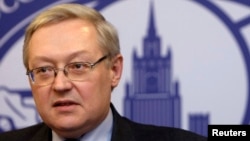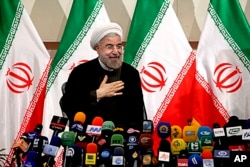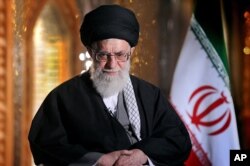MOSCOW —
Russia voiced concern on Thursday that no progress has been made towards organizing new talks between Iran and six world powers on Tehran's nuclear program, despite the election of a relative moderate as Iran's president.
Deputy Foreign Minister Sergei Ryabkov said a diplomatic push had been launched to arrange a new round of talks after Hassan Rowhani was elected president on June 14 but made clear there had been no breakthrough.
“There is no agreement now on when and where the next round will be. That worries us,” Ryabkov told Interfax news agency. “After the election of the Iranian president, we stepped up work in preparation for a new round of talks but so far the work is not being done transparently.”
The last high-level talks between Iran and the United States, Russia, China, Britain, France and Germany were held in the Kazakh city of Almaty in April.
They failed to end the deadlock in a decade-old dispute over Tehran's nuclear program, prolonging a stand-off that could yet spiral into a new Middle East war. Israel has long hinted at possible air strikes to deny its arch-foe any means to make a nuclear bomb.
At those talks, the six asked Iran to suspend its most sensitive uranium-enrichment work in return for modest relief from international sanctions, an offer Tehran did not accept.
International hopes for a resolution of the nuclear dispute were boosted by the election of Rowhani because he has promised a more conciliatory approach to foreign relations than incumbent President Mahmoud Ahmadinejad.
Iran says it is enriching uranium only to fuel a planned network of nuclear power stations, and for medical purposes.
But refined uranium also provides the fissile material for nuclear bombs if processed further, which the West fears may be Tehran's ultimate goal.
U.S. sets sights on ending standoff
A senior U.S. official on Wednesday said that Washington was “determined” to try to resolve the nuclear stand-off with Tehran diplomatically and urged Tehran to return to negotiations.
“The window for such a solution is open and we intend to pursue it,” Thomas Countryman, assistant secretary for International Security and Non-Proliferation, said. “We are willing to be optimistic about the possibility of a changed policy in Tehran but it needs to be expressed through actual negotiations and not simply with rhetorical statements.”
Tehran's team at nuclear talks with the six world powers has been led by Saeed Jalili, who was a rival election candidate, and is likely to be overhauled once Rowhani takes office in early August.
But Countryman cautioned against hopes that the new president would have the will and the power to shift Iran's nuclear policy.
“When he [Rowhani] does take office, we've got no reason to believe that it changes the fact that the unique authority for the nuclear weapons program in Iran rest with the supreme leader and not with the office of the president,” he said.
Iran's theocratic Supreme Leader Ayatollah Ali Khamenei accused the West last week of being inflexible in negotiations and expressed a desire to resolve an issue which has led to ever tighter sanctions on Iran's oil sector and the wider economy.
New U.S. sanctions that came into effect on Monday target trade with Iran's shipping and automobile sectors, gold sales to Iran and handling of the Iranian currency, the rial, a further attempt to force Tehran to curb its nuclear activities.
World powers want Iran to halt its most sensitive enrichment to a fissile concentration of 20 percent and stop work at its underground Fordow plant. Iran refines uranium at Fordow to a level that is relatively close to the threshold needed for nuclear weapons.
Deputy Foreign Minister Sergei Ryabkov said a diplomatic push had been launched to arrange a new round of talks after Hassan Rowhani was elected president on June 14 but made clear there had been no breakthrough.
“There is no agreement now on when and where the next round will be. That worries us,” Ryabkov told Interfax news agency. “After the election of the Iranian president, we stepped up work in preparation for a new round of talks but so far the work is not being done transparently.”
The last high-level talks between Iran and the United States, Russia, China, Britain, France and Germany were held in the Kazakh city of Almaty in April.
They failed to end the deadlock in a decade-old dispute over Tehran's nuclear program, prolonging a stand-off that could yet spiral into a new Middle East war. Israel has long hinted at possible air strikes to deny its arch-foe any means to make a nuclear bomb.
At those talks, the six asked Iran to suspend its most sensitive uranium-enrichment work in return for modest relief from international sanctions, an offer Tehran did not accept.
International hopes for a resolution of the nuclear dispute were boosted by the election of Rowhani because he has promised a more conciliatory approach to foreign relations than incumbent President Mahmoud Ahmadinejad.
Iran says it is enriching uranium only to fuel a planned network of nuclear power stations, and for medical purposes.
But refined uranium also provides the fissile material for nuclear bombs if processed further, which the West fears may be Tehran's ultimate goal.
U.S. sets sights on ending standoff
A senior U.S. official on Wednesday said that Washington was “determined” to try to resolve the nuclear stand-off with Tehran diplomatically and urged Tehran to return to negotiations.
“The window for such a solution is open and we intend to pursue it,” Thomas Countryman, assistant secretary for International Security and Non-Proliferation, said. “We are willing to be optimistic about the possibility of a changed policy in Tehran but it needs to be expressed through actual negotiations and not simply with rhetorical statements.”
Tehran's team at nuclear talks with the six world powers has been led by Saeed Jalili, who was a rival election candidate, and is likely to be overhauled once Rowhani takes office in early August.
But Countryman cautioned against hopes that the new president would have the will and the power to shift Iran's nuclear policy.
“When he [Rowhani] does take office, we've got no reason to believe that it changes the fact that the unique authority for the nuclear weapons program in Iran rest with the supreme leader and not with the office of the president,” he said.
Iran's theocratic Supreme Leader Ayatollah Ali Khamenei accused the West last week of being inflexible in negotiations and expressed a desire to resolve an issue which has led to ever tighter sanctions on Iran's oil sector and the wider economy.
New U.S. sanctions that came into effect on Monday target trade with Iran's shipping and automobile sectors, gold sales to Iran and handling of the Iranian currency, the rial, a further attempt to force Tehran to curb its nuclear activities.
World powers want Iran to halt its most sensitive enrichment to a fissile concentration of 20 percent and stop work at its underground Fordow plant. Iran refines uranium at Fordow to a level that is relatively close to the threshold needed for nuclear weapons.












